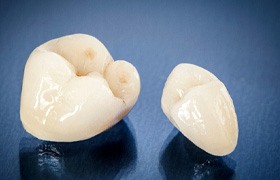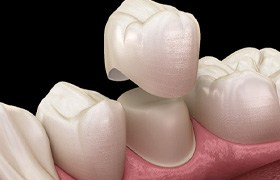Dental Crowns – Milton, MA
Solid Armor for Your Weak Teeth
As careful as you may be, your teeth will likely get damaged over the years. You could have an accident and chip one, or maybe you’ll develop a cavity. However, you don’t need to live with this dental harm. A much better option is to get dental crowns in Milton, particularly those from our office. Our dentists will use these special caps to make your weak teeth strong again. Just keep reading to learn how they work, or call our office soon.
What is a Dental Crown?

In essence, a dental crown is a small cap made to fit over a damaged tooth. It fully covers the tooth’s weakened area to protect (and sometimes hide) the site. This effect leads to a healthier smile, as the crown keeps harmful bacteria and debris from reaching the damaged spot.
Given how dental crowns work, the best candidates for them have some form of dental damage or decay. One example is a cracked or broken tooth, while another is a cavity that can’t be filled. Teeth eroded by a grinding habit or that just had root canals also apply.
Of course, the best way to confirm your candidacy is to consult our dentists. They can closely examine your teeth and see if a dental crown suits you.
The Materials Used for Dental Crowns
At our office, dental crowns can be made from a wide range of materials. These include the following:
- E-max – E-max is a kind of ceramic, so E-max crowns look great and tend to be durable. That said, they can be more expensive than other types.
- Zirconia – Zirconia crowns tend to be pretty and long-lasting. Even so, they can be difficult to adjust to.
- Porcelain-Fused-to-Metal (PFM) – PFM crowns use a metal base with a porcelain coating. They combine great aesthetics and high durability, though they can also have a gray line at the gumline.
- Gold – Gold crowns last the longest and only require a small amount of enamel removal. Overall, their main drawback is their metallic color.
The Dental Crown Process

A dental crown treatment takes two dental visits. We’ll spend the first appointment prepping your tooth for its restoration. We'll place the final dental crown at the follow-up visit a few weeks later.
At the initial visit, our team will prepare your tooth for its crown. This process will remove some enamel from the treated area. From there, we’ll make an impression of the prepared tooth and send it to a dental lab. Workers will then use this impression to craft your final restoration. Their crafting method takes a few weeks, though, so you’ll wear a temporary crown in the meantime.
When your dental crown is ready, you’ll attend the follow-up visit. Placing this prosthetic won’t take long and won’t involve sedation. Instead, our dentists will just set your crown in place and make some last-minute changes to ensure a good fit. We’ll then polish the dental cap and send you on your way!
The Benefits of Getting a Dental Crown

With a dental crown, you’ll enjoy many perks. The most common ones are:
- Custom Results – Depending on the material, a dental crown can match your other teeth. Your treatment results could then blend seamlessly with your smile.
- Tooth Protection – Dental crowns protect teeth from bacteria, and they can withstand your mouth’s bite force. Therefore, they’ll help you avoid needing a root canal or tooth extraction.
- Versatility – Since a dental crown covers the whole top of your tooth, it can fix cavities, chips, fractures, etc.
- Long Lifespan– A dental crown can last 15+ years with the proper care.
Dental Crown FAQs
How Long Do Dental Crowns Last?
On average, one can expect their dental crown to last anywhere between 5 and 15 years. However, this can vary depending on the material the crown is made from. Metal crowns sometimes have a slightly longer lifespan than metal-free ones. More so than the material, the longevity of your crown depends on individual factors, including your diet, oral hygiene, and bad habits, like smoking, nail-biting, and teeth grinding. Crowns placed on the front teeth might last slightly longer than crowns on the molars because they are not subjected to as much wear and tear from frequent chewing.
How Do You Know When a Dental Crown Needs to Be Replaced?
The only way to know for sure whether a dental crown needs to be replaced is to have it examined by your dentist. That being said, certain warning signs indicate that a crown is approaching the end of its lifespan. Here are some things to keep an eye out for:
- Pain: If your crowned tooth is painful, there could be decay underneath. This means that the crown needs to be removed so the tooth can be treated.
- Loose: If you feel like your crown is loose, especially when you are eating something sticky, you should give us a call.
- Worsened Appearance: If your dental crown is chipped or discolored, it can take away from a patient’s self-confidence. This is a valid reason to have it replaced.
- Dark Line Around Base: With porcelain-fused-to-metal crowns, the porcelain layer can wear away, revealing the darker metal portion. This could indicate that the crown needs to be replaced.
Do Dental Crowns Feel Natural?
Within a few days of receiving your permanent dental crown, it should begin to feel increasingly natural. Dental crowns are made from durable materials that can stand up to everyday chewing forces as easily as your natural tooth enamel, so eating with your dental crown shouldn’t feel odd. The reason that your tooth was reshaped before you got the crown was to ensure that it fits comfortably within your mouth. Additionally, every crown is customized based on impressions taken of the tooth. Your crown shouldn’t even feel noticeable.
Are Dental Crowns Covered by Insurance?
Most dental insurance plans consider dental crowns to be a “major procedure.” This means that when they are medically necessary, they are usually eligible for coverage at 50% after you’ve paid your deductible and before you’ve exceeded your annual maximum. Just keep in mind that every insurance plan is different, so it is best to review your plan and/or check with your provider directly, so you don’t run into any surprises. We’d also be happy to help you with this process. At Milton Hill Dental, we are proud to accept nearly all dental insurance, so don’t hesitate to contact us with questions and concerns.

